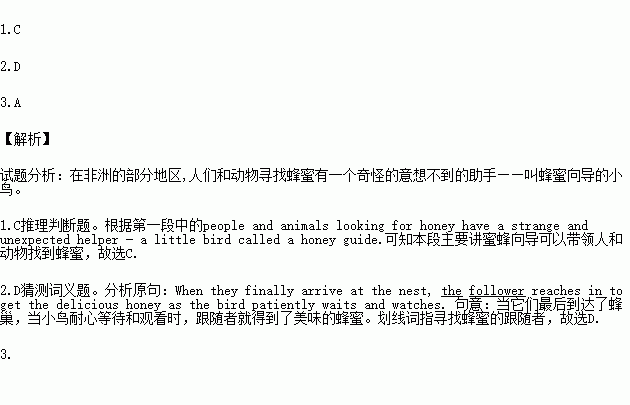题目内容
Honey from the African forest is not only a kind of natural sugar, it is also delicious. Most people, and many animals, like eating it. However, the only way for them to get that honey is to find a wild bees' nest and take the honey from it. Often, these nests are high up in trees, and it is difficult to find them. In parts of Africa, though, people and animals looking for honey have a strange and unexpected helper - a little bird called a honey guide.
The honey guide does not actually like honey, but it does like the wax in the beehives (蜂房). The little bird cannot reach this wax(蜂蜡), which is deep inside the bees' nest. So, when it finds a suitable nest, it looks for someone to help it. The honey guide gives a loud cry that attracts the attention of both passing animals and people. Once it has their attention, it flies through the forest, waiting from time to time for the curious animal or person as it leads them to the nest. When they finally arrive at the nest, the follower reaches in to get at the delicious honey as the bird patiently waits and watches. Some of the honey, and the wax, always falls to the ground, and this is when the honey guide takes its share.
Scientists do not know why the honey guide likes eating the wax, but nothing can prevent the birds from making efforts to get it. The birds seem to be able to smell wax from a long distance away. They will quickly arrive whenever a beekeeper is taking honey from his beehives, and will even enter churches when beeswax candles are being lit.
1.What can we know from paragraph 1?
A. The wild bees’ nests can be easily found.
B. The wild bees’ honey isn’t a natural sugar.
C. A honey guide can help people find the honey.
D. A honey guide is a local villager living in the forest.
2.The underlined word “the follower” in paragraph 2 refers to________.
A. A member of a nest’s bees.
B. A bird which feeds on bees.
C. A person who raises bees.
D. A person who hunts for honey.
3.Which words can best describe a honey guide ?
A. Determined and smart.
B. Selfish and self-centered.
C. Helpful and Humorous.
D. Stubborn and mean.
 天天向上一本好卷系列答案
天天向上一本好卷系列答案 小学生10分钟应用题系列答案
小学生10分钟应用题系列答案
